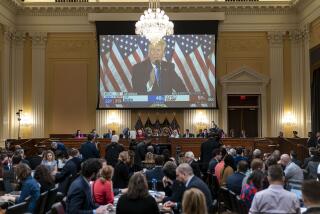Witnesses: a Pandora’s Box
- Share via
Last week was the turn of the Republicans to make their case to the Senate for removing President Clinton from office. For the most part the 13 House managers argued effectively, albeit in anesthetizing detail, that Clinton should be found guilty of perjury and--far more circumstantially and less convincingly--of obstructing justice. Today it is the turn of the president’s lawyers to dispute the GOP presentation while focusing on what has always been the core issue in the process: whether the crimes Clinton is accused of, even if proven to the satisfaction of two-thirds of the senators, meet the constitutional standard for impeachment.
The disputable meaning and intent of the impeachment clause--”The president . . . shall be removed from office on . . . conviction of treason, bribery, or other high crimes or misdemeanors”--may be a lawyer’s delight, but for the Senate, sitting as a court, it presents a political minefield through which each senator must warily seek his own path. Anyone who has looked objectively at the record knows that Clinton lied to a grand jury. He did so in a foolish effort to evade the political consequences of admitting publicly to an extramarital affair. Perjury is a serious crime. But does Clinton’s lying rise to the level of treason or bribery? Does it threaten the security of the nation?
What Clinton did may speak volumes about his character. But what he did can hardly have been what the framers of the Constitution were thinking of when they set the conditions for removing a president from office.
By the end of this week the Senate’s GOP majority could vote to summon Monica S. Lewinsky and other witnesses to try to resolve some of the contradictions in this case. Once that door is opened, fairness requires that the White House be able to call witnesses of its choosing, something that could extend the trial for weeks. Yet, whatever more may be said, the outcome remains all but assured: Clinton will be acquitted for lack of the 67 votes needed to convict him.
What, then, is served by prolonging this process? The best course is still to dispense with witnesses and have an early canvass to test whether there is any chance Clinton could be convicted. If there is none, the Senate should move directly to censure the president for trashing the dignity and honor of his office and let him--and the Congress--move on with governing our country.
More to Read
Sign up for Essential California
The most important California stories and recommendations in your inbox every morning.
You may occasionally receive promotional content from the Los Angeles Times.













